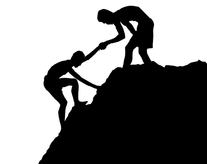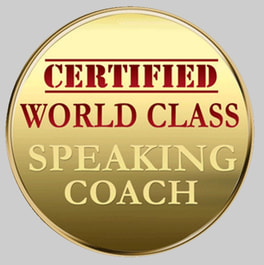
Abraham Lincoln once said, “Whatever you are, be a good one.” The question in this article is, what makes a good salesperson?
As I alluded to in the previous article, people tend to react negatively to unsolicited sellers. Whether you are accosted in a clothes shop, telephoned by a service provider, or pitched by a sales presentation at a promotional event, the result is usually the same… “sounds great - please leave me alone.” Not always of course, but often.
In addition, many sellers shy away, or feel ashamed of, the idea of selling. They carry an underlying guilt about the idea of persuading people into doing or buying whatever they want for their own professional and/or person gain. After all, you could say that people sell because they want to get something from you; money, power or some other advantage. I mean, what’s not to like?
Unfortunately, these people have set the goalposts for selling in a very old-school way. Images of the snake oil second-hand car salesman (or the door-to-door vacuum cleaner peddler) unfortunately dirty the reputation of sales and persuasion. Selling seems to be such a nakedly brazen endeavour. But it need not be this way…
What if, instead of making yourself the “persuader”; looking for your goal… imagine yourself as the “giver”; helping people, by offering something more valuable than what you are asking for. In this light, you are the “facilitator” of an outcome that benefits the buyer.
It doesn’t matter if you are selling a product, service or message. As long as it’s more valuable than what you are looking for (or at the very least, mutually beneficial), then surely it would be selfish not to try to sell, right?
Of course, I’m assuming whatever you are selling (or persuading) is genuinely beneficial. Even if you (or some third party) seem to be the only ones getting something tangible, there should at least be a philosophical benefit for the buyer; i.e. they get to help a cause, take part in a charitable event, etc. Your buyer (e.g. audience) should at least feel better about themselves. There’s value in that.
Go even further… imagine your product, service or message as a no-brainer for your audience. Now your job is to help them by offering it up in most helpful way possible. As an example, imagine you are browsing in a clothes shop. An assistant walks up to you and says:
“Can I help you?”
What is your first reaction?
“I’m just browsing” meaning “leave me alone.”
What if that browser said something like, “Hi. I noticed you are interested in tops. Let me show you something that would suit your figure.”
…or maybe…
“Hi. I have something much better quality at a better price. Let me show you.”
Tell the truth, you are much more likely to indulge the assistant. Why? Because they are now being helpful.
It’s the same idea for public speaking. I’ve already written about the differences between speaking to persuade and speaking to inform. However, in truth, these days persuasive speaking is becoming more informative. The reason is that people want information so that they can sell to themselves.
Studies have shown that people who purchase electronic goods in stores are more likely to research products online before purchasing. They may even research while in the store (watch for shoppers surfing www.amazon.com on their smartphones for reviews, the next time you are in PC World).
Bearing in mind that people want to make up their own minds, why not re-structure your next pitch to be as informative as possible about whatever you are selling. Imagine every uncertainty a prospect could possibly have, and address those concerns in an authentic way.
There is a superb book by Jay Baer called “Youtility”. He champions this new idea taking the marketing world by storm. It’s also evolving in the sales and speaking world. One of Jay’s top tips is:
“Don’t try to be the best. Try to be the most helpful.”
It may feel like you are being a more passive seller. To be frank, it takes confidence to hang back from being pushy, and instead let the help do the work. The advantage to your prospect is that they won’t feel like they are being coerced. The advantage for you is that, even if your audience mightn’t be interested in buying that day, they may know someone who could benefit. This is called “word of mouth” and it is the most powerful marketing tool of persuasion. However, word of mouth only works for those who are known to be helpful.
Furthermore, if you are an extremely helpful presenter/seller (someone who even offers free tips or ideas) it doesn’t matter if someone doesn’t buy from you straight away. At some point in the future they might decide they need something. And when they do, who are they going to think of? A pain in the ass, or someone who is helpful?
As Jay Baer mentions in his book: “If you sell something, you get a customer for a day; help someone, you get a customer for life.”
This is true for marketing, business and public speaking.
As I alluded to in the previous article, people tend to react negatively to unsolicited sellers. Whether you are accosted in a clothes shop, telephoned by a service provider, or pitched by a sales presentation at a promotional event, the result is usually the same… “sounds great - please leave me alone.” Not always of course, but often.
In addition, many sellers shy away, or feel ashamed of, the idea of selling. They carry an underlying guilt about the idea of persuading people into doing or buying whatever they want for their own professional and/or person gain. After all, you could say that people sell because they want to get something from you; money, power or some other advantage. I mean, what’s not to like?
Unfortunately, these people have set the goalposts for selling in a very old-school way. Images of the snake oil second-hand car salesman (or the door-to-door vacuum cleaner peddler) unfortunately dirty the reputation of sales and persuasion. Selling seems to be such a nakedly brazen endeavour. But it need not be this way…
What if, instead of making yourself the “persuader”; looking for your goal… imagine yourself as the “giver”; helping people, by offering something more valuable than what you are asking for. In this light, you are the “facilitator” of an outcome that benefits the buyer.
It doesn’t matter if you are selling a product, service or message. As long as it’s more valuable than what you are looking for (or at the very least, mutually beneficial), then surely it would be selfish not to try to sell, right?
Of course, I’m assuming whatever you are selling (or persuading) is genuinely beneficial. Even if you (or some third party) seem to be the only ones getting something tangible, there should at least be a philosophical benefit for the buyer; i.e. they get to help a cause, take part in a charitable event, etc. Your buyer (e.g. audience) should at least feel better about themselves. There’s value in that.
Go even further… imagine your product, service or message as a no-brainer for your audience. Now your job is to help them by offering it up in most helpful way possible. As an example, imagine you are browsing in a clothes shop. An assistant walks up to you and says:
“Can I help you?”
What is your first reaction?
“I’m just browsing” meaning “leave me alone.”
What if that browser said something like, “Hi. I noticed you are interested in tops. Let me show you something that would suit your figure.”
…or maybe…
“Hi. I have something much better quality at a better price. Let me show you.”
Tell the truth, you are much more likely to indulge the assistant. Why? Because they are now being helpful.
It’s the same idea for public speaking. I’ve already written about the differences between speaking to persuade and speaking to inform. However, in truth, these days persuasive speaking is becoming more informative. The reason is that people want information so that they can sell to themselves.
Studies have shown that people who purchase electronic goods in stores are more likely to research products online before purchasing. They may even research while in the store (watch for shoppers surfing www.amazon.com on their smartphones for reviews, the next time you are in PC World).
Bearing in mind that people want to make up their own minds, why not re-structure your next pitch to be as informative as possible about whatever you are selling. Imagine every uncertainty a prospect could possibly have, and address those concerns in an authentic way.
There is a superb book by Jay Baer called “Youtility”. He champions this new idea taking the marketing world by storm. It’s also evolving in the sales and speaking world. One of Jay’s top tips is:
“Don’t try to be the best. Try to be the most helpful.”
It may feel like you are being a more passive seller. To be frank, it takes confidence to hang back from being pushy, and instead let the help do the work. The advantage to your prospect is that they won’t feel like they are being coerced. The advantage for you is that, even if your audience mightn’t be interested in buying that day, they may know someone who could benefit. This is called “word of mouth” and it is the most powerful marketing tool of persuasion. However, word of mouth only works for those who are known to be helpful.
Furthermore, if you are an extremely helpful presenter/seller (someone who even offers free tips or ideas) it doesn’t matter if someone doesn’t buy from you straight away. At some point in the future they might decide they need something. And when they do, who are they going to think of? A pain in the ass, or someone who is helpful?
As Jay Baer mentions in his book: “If you sell something, you get a customer for a day; help someone, you get a customer for life.”
This is true for marketing, business and public speaking.


 RSS Feed
RSS Feed
